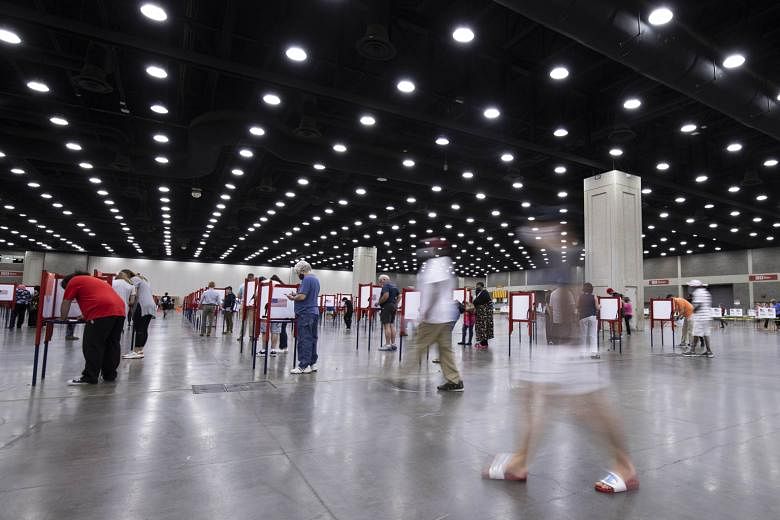NEW YORK • The cliffhanger elections on Tuesday night in Kentucky and New York did not just leave the candidates and voters in a state of suspended animation wondering who had won.
Election officials, lawyers and political strategists in the Republican and Democratic parties said the lack of results was a preview of what could come after the presidential polls close on Nov 3: No clear and immediate winner.
With the coronavirus pandemic swelling the number of mailed-in ballots to historic highs across the United States, the process of vote-counting has become more unwieldy, and election administrators are straining to keep up and deliver timely results.
The jumble of election rules and deadlines by state, including in presidential battlegrounds like Pennsylvania and Wisconsin, all but ensure that the victor in a close race will not be known on Nov 3.
And top election officials warn that if the race between Mr Donald Trump and Mr Joe Biden is anything but a blowout, the public and politicians will have to recalibrate expectations for when the 2020 campaign will arrive at a decisive conclusion.
"I don't think it matters when you go to bed - you can stay up as late as you want, you won't have an answer," said Mr Chris Thomas, who served for 36 years as the state director of elections in Michigan.
Already in this primary season, state after state has seen it take longer than usual to tally enough votes to project winners.
New York and Kentucky are just the latest, vivid preludes for the general election: Record numbers of absentee ballots that are more labour intensive to count; regulations that delay the counting; fears about in-person voting because of the virus; and legal manoeuvring around how late people can vote, including allowing ballots to be postmarked all the way up to election day.
In November, a significant delay would not just test the nation's resolve and patience, especially if late-counted votes reverse the early tally in a pivotal state, as has often happened in statewide and congressional contests. But a hold-up could play into the hands of Mr Trump, who has been on a tear recently to undermine trust in fairly conducted elections, such as his accusations that mail-in ballots are somehow systemically "rigged".
While the virus is almost certain to make the November election the most unusual since the hanging chads of 2000, any drawn-out or disputed vote count could provide Mr Trump with an opening to fight results he did not like and shake trust in American democracy.
Mr Matt Masterson, a senior adviser on election security for the Department of Homeland Security, said the greater number of mail-in ballots this year would make results take longer to tabulate than in the past, but he was hesitant to even use the word "delay", saying "that suggests something's wrong".
"The need to take a longer time to process and count these ballots is a sign of the process working," Mr Masterson added. "It is in no way an indication of anything malicious."
In the presidential race, the vote margins in most places are expected to be wide enough to allow media organisations, such as The Associated Press (AP), to project winners of individual states even before all the votes are tabulated. But delays are widely expected in at least some key states, which could leave the country in momentary political limbo if neither candidate has reached the 270 electoral votes required to win the presidency.
Mr David Scott, deputy managing editor for AP, said how long it takes to call the presidential race in November will depend on the closeness of the race and whatever rules states impose between now and election day. AP will have to account for the huge wave of mail-in votes, especially after incorrectly declaring two races in Georgia were headed to run-offs this month.
"I've been saying to anyone who will listen that I do not think we will know who won the presidential election on Nov 3," said Mr Matthew Weil, director of the elections project at the Bipartisan Policy Centre, a think-tank.
NYTIMES

